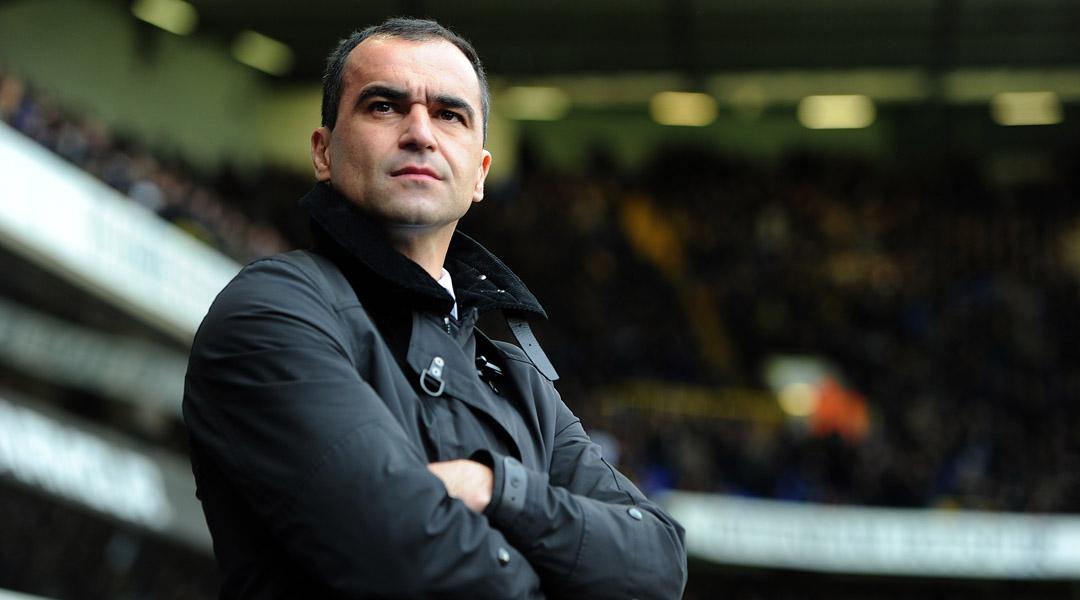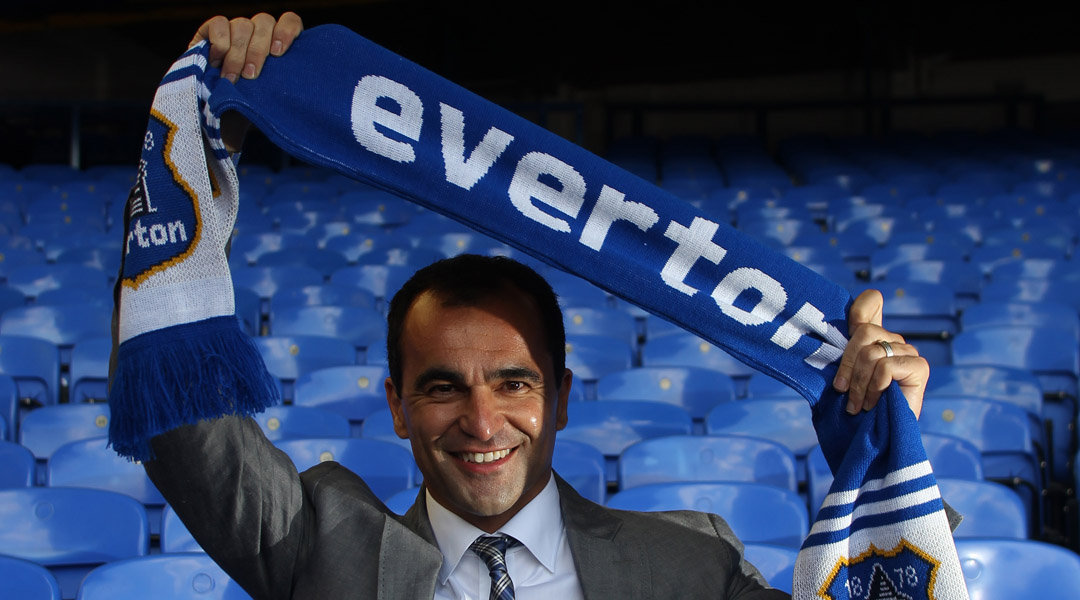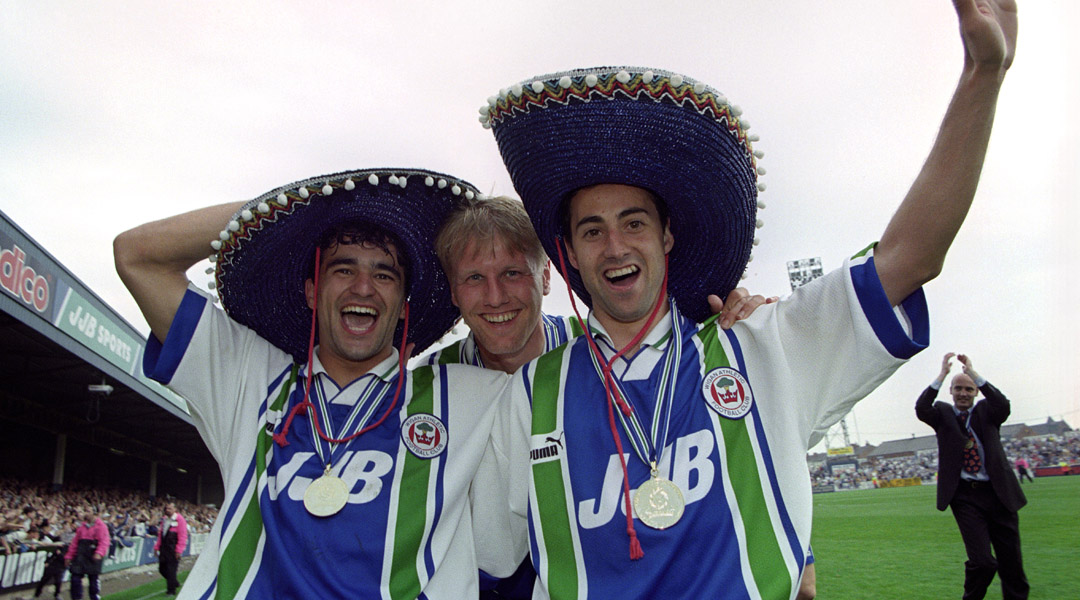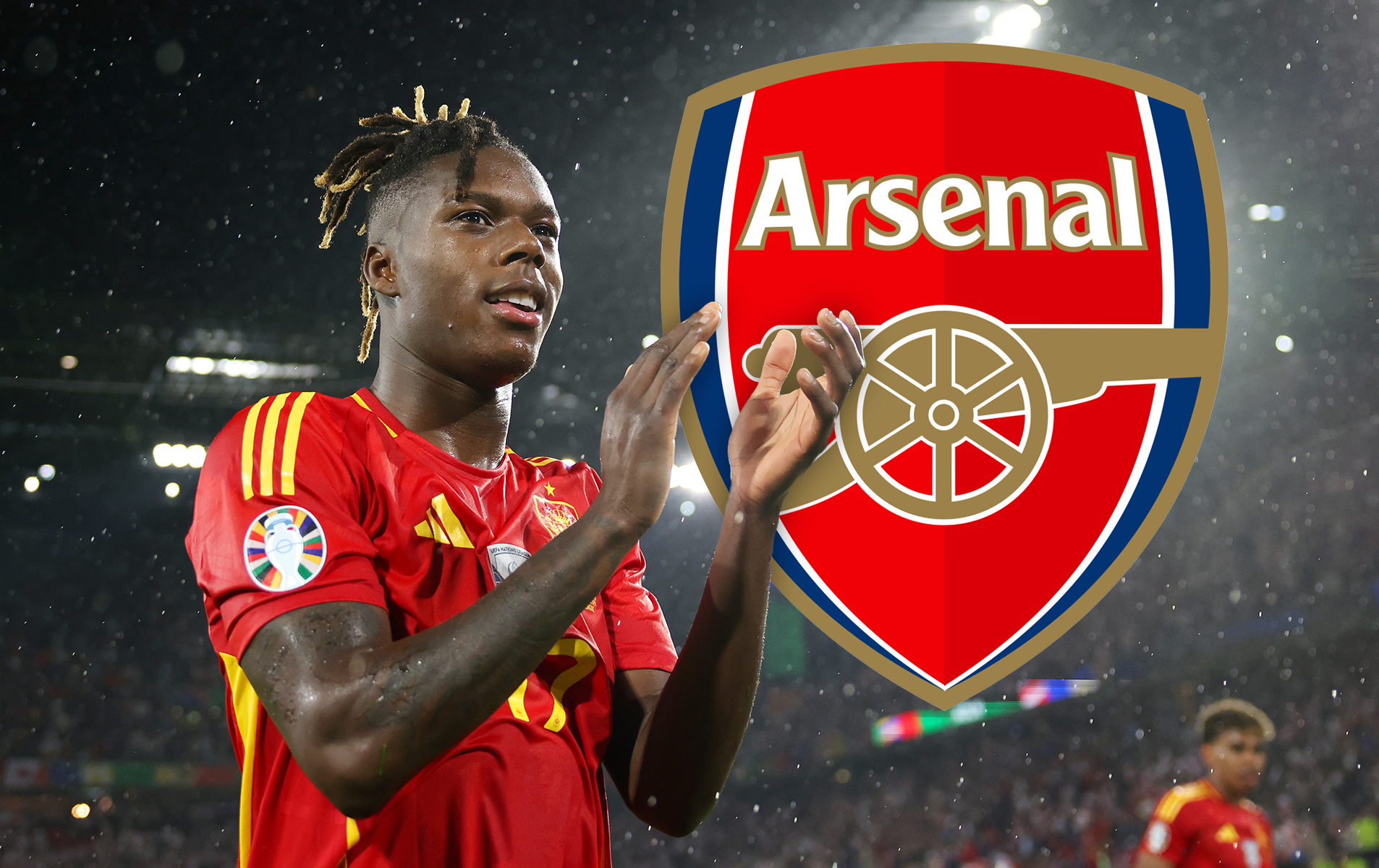How Everton's 'man of surprises' Martinez snuck up on Wenger and Arsenal
In the space of little under a year, Roberto Martinez has changed perceptions of both himself and his new club, Everton - but how did he do it?

On a sunny October afternoon on the steps of Everton’s Finch Farm training ground, Roberto Martinez awaits the club’s most successful manager. Everton have been ensconced in the world-class facility for six years, but it's only now, four months into Martinez’s reign that Howard Kendall – three times Everton boss, twice a league champion, FA Cup winner, European Cup Winners' Cup winner – has been invited to look around.
“Legend!” the Catalan greets Kendall as he embraces the 67-year-old.
Finch Farm represents a new epoch in Everton’s history, but everywhere you go there are reminders of the club’s past. Club legends Duncan Ferguson, Kevin Sheedy and David Unsworth are now on the coaching staff, and greet their old boss, Kendall, as he is shown around. In Martinez’s office are several histories of the club, and when the Spaniard hears I have written one of them he fires off a series of questions about Everton’s historic split in 1892, which led to the birth of Liverpool. Afterwards, Martinez takes tea with Kendall and listens to his views on the club he once ruled.
At a time in which football is richer, more globalised, and when the focus is more skewed towards an elite of superclubs than ever before, it is easy for casual fans to forget that Everton are English football’s fourth most successful club. Like hard-up aristocrats trying to keep pace with a nouveau riche, the world’s view of them has been obscured by the blizzard of oil and TV money that has washed over the rest of English football’s elite.

“Financially, those clubs work in a different place. But I think everyone at Everton knows we belong in that group,” Martinez told the Independent last summer.
In the absence of trophies, superstars, and Champions League football, the club are left to define themselves in other ways. History, tradition, development of local talent, the idea that Everton are somehow ‘the People’s Club’ – a term coined by David Moyes on his first day as Everton manager – are unheralded virtues, but ones which have combined to forge a proud identity at English football’s top table.
Tradition seems to be lost in the modern game a little bit, but Everton is the opposite.
Martinez has not only understood these ideas, but enhanced them. As with the numerous community engagements he has carried out since becoming Everton manager – duties which his predecessor seemingly deemed superfluous to his role – Kendall’s invitation to Finch Farm was no PR stunt. It was an attempt to embrace and understand the club’s heritage and ethos. “Tradition seems to be lost in the modern game a little bit, but Everton is the opposite,” Martinez has said. “We are very proud of our heritage and our history.”
Get FourFourTwo Newsletter
The best features, fun and footballing quizzes, straight to your inbox every week.
These are important things for Evertonians and have helped seduce a success-starved support. The growing love affair between fans and manager has been increased by his humility, dignity and decency. Meet him and he makes you feel as if you are the most important person in the world.
But what counts most is winning, and Martinez has brought that back to Everton. With seven Premier League games to go, Everton are just five points off their best ever haul of 65. On a points-per-game basis, they are only fractionally behind their 1986/87 title win. Beat Arsenal on Sunday and Everton are just a single point from a Champions League spot with a game in hand.
Defying stereotypes
At a time when the Spanish national team rules supreme over the international game, inflecting European club football with its brand of intricate, high-tempo football; when Spanish players and managers are the most desired in world football, Martinez would seem to be very much seem to be a man of his time. Yet this is a man defined by defiance of stereotypes.
For Martinez there was no La Masia education, no grounding in the Bernabeu or Mestalla. He was born in Balaguer, a town 150km north west of Barcelona, in 1973. A defensive midfielder, he was signed by Real Zaragoza as a youngster, simultaneously studying physiotherapy, but making just two appearances before the defining move of his career in July 1995. With Isidro Diaz and Jesus Seba he joined Wigan Athletic, then in the fourth tier of English football and playing in front of 3,000 fans at Springfield Park.
Invariably dubbed the ‘Three Amigos’, it seemed implausible in the mid-1990s that any foreign player could succeed – or even want to play – in the grit and mud of English football’s nether regions. Far from faltering, it could be said that Martinez went native.

He excelled in six years at Wigan. There was a brief spell in the Scottish Premier League with Motherwell, where he met and married his Scottish wife, Beth, and at Walsall before he moved to Swansea in January 2003. He captained the Swans to promotion to League One in 2005, and although he was released a year later, he returned as manager – via six months at Chester City – in February 2007.
93-94: R.Zaragoza 2 games (0 goals)
95-01: Wigan Athletic 226 (24)
01-02: Motherwell 16 (0)
02-03: Walsall 6 (0)
03-06: Swansea City 139 (4)
06-07: Chester City 38 (3)
Wigan, Motherwell, Walsall, Chester, Swansea; a manager who seemed to represent football’s rising force of Spain had actually been grounded in British football’s more agricultural outposts. He was, he says, “a technical player” but found himself confronted with the need “to find a way to survive in a league where the football wasn’t based on the possession game”. In finding a place for his attributes as a player in a footballing world where they were alien, Martinez the manager was shaped. This, he said in a 2012 interview with the Blizzard, “Gave me a manager’s mind”.
His appointment as Swansea manager at the age of just 33, was, with hindsight, inspired, but at the time seemed a huge gamble. Improbably youthful, Martinez replaced Kenny Jackett, who had previously won promotion, and instilled a brand of patient, passing football that was as alien to League One as a Spanish midfielder in Wigan a decade earlier. His footballing idealism succeeded in a win-at-all-costs world and he took the club into the Championship for the first time in a generation.
In 2009 came an offer he couldn't turn down: Wigan, his old club, in the Premier League. His four years there witnessed pure football, some horrendous losing streaks, two great escapes and ended last May in relegation but also with the FA Cup, after a famous last-gasp victory over Manchester City. By then, achieving the improbable had become accepted as normal for the ‘English Spaniard’.
The idealist replaces the pragmatist
The years at Wigan, in the full view of the football world, formed a number of ideas about Martinez – too idealistic, too nice, too defensively naïve, too prepared to chase cups at the cost of survival – that caused some nervousness when he was appointed Everton manager last summer. If Moyes was the great pragmatist, how would Everton fare under such a footballing idealist? When the pundits put in their pre-season predictions, David James claimed that Everton would finish 16th, between Stoke and Cardiff.
Martinez would not be Martinez if he didn’t go about proving his doubters wrong, and Everton have been one of the stories of the current season. Fifth in the league, the ‘defensively naïve’ Spaniard oversees the Premier League’s third-best defence, and no team has lost fewer games than the Toffees.
What have been the key components of Martinez’s success at Goodison? Certainly he was blessed with his inheritance. David Moyes left him the most talented Everton squad since Kendall’s title winners. Yet some of those players have progressed dramatically, notably Seamus Coleman, who has become the most coveted right-back in the Premier League, and Tim Howard, who has transcended his reputation as a steady goalkeeper to become one who actually wins his team points.

Much has been made of Martinez’s use of the loan market, and the acquisitions of Gareth Barry and Romelu Lukaku, who have replaced the retired Phil Neville and the misfiring Nikica Jelavic, have discernably improved the Everton squad. An in-form goalscorer is something Everton have lacked for most of a generation, but Lukaku has averaged a goal every game for Everton and his tally of 12 Premier League goals so far has been bettered just three times in the past 20 years. James McCarthy, who came in for Marouane Fellaini, has added a different dynamic to the midfield (although the Belgian’s current malaise overshadows just what a good player he was for Everton).
He is tactically astute, his teams changing shape several times in a match. Beneath the affable veneer there is a huge work ethic and obsessive attention to detail. At his home he is said to sit in front of a bank of television sets each evening watching game after game, studying opponents and transfer targets. Like Moyes he borrows from non-football disciplines and has a diploma in business management from Manchester Metropolitan University.
2007-09: Swansea City 126 games (50% win rate)
League One winners, 2008
2009-13: Wigan Athletic 176 (28.98%)
FA Cup winners, 2013
2013-present: Everton 37 (56.76%)
Yet perhaps it is the positivity that radiates from the manager on and off the pitch that has been the true difference. Evertonians went into games under Moyes expecting not to lose. Under Martinez they expect to win. The club has become a happy place. This stems not just from winning, but the ethos of inclusivity and respect that emanates from the manager.
The margins between success and failure in this most tightly balanced of Premier League seasons remain tantalisingly slim. Had Everton beaten Chelsea at Stamford Bridge in February as they perhaps should have done (they lost to 1-0 to a last-minute John Terry goal), and if they had held on to beat Liverpool in the Goodison derby back in November (another last-minute goal brought a 3-3 draw), they would be within touching distance of the top.
Fourth place looks the best they can hope for now, and between them and that goal stands Arsenal, who they face at Goodison on Sunday. Twice in the past year the Gunners have undone Martinez at crucial junctures – last May when they relegated Wigan with a 4-1 defeat at the Emirates, and again last month when they beat Everton by the same score in the FA Cup quarter-final. The omens might not look good based on such form, but what would Martinez be if not a man of surprises?
